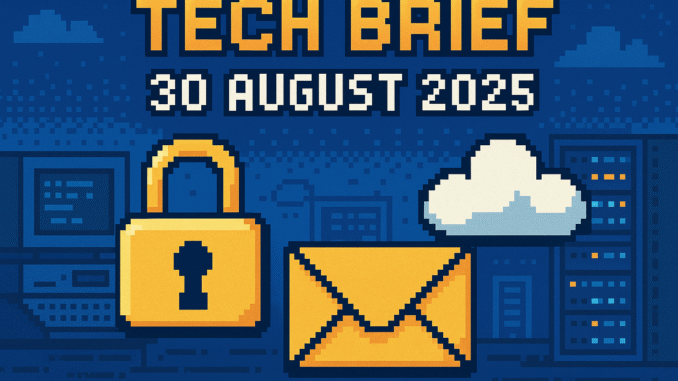
Tech Brief 30 August 2025 brings you the latest on persistent data mishaps, digital sovereignty disputes, and cryptography policy battles that just refuse to become history. If you care where your bits and bytes end up, or you want to know how the cold logic of teletype diplomacy helped shape your encrypted chats, you’re in the right place.
Missed yesterday’s Tech Brief? Catch up here before diving in.
Major UK Data Breaches Reveal Persistent Email Errors
“Still slipping up on the BCC field, I see?” Ministers have finally published the much-delayed review of 11 major public sector data breaches, outing everything from exposed disability claimants to Afghan allies caught up by administrative bungling. This long-awaited 2023 review, held back for nearly two years, highlights alarmingly simple mistakes: confidential info sent to the wrong recipients, sloppy email controls, and data exports with few checks. The kind of thing a sharp-eyed sysadmin, or even a late-night Usenet post, railed against as far back as the early nineties.
What stands out is how these ancient practices, bad habits that might have ruined your club’s mailing list, now threaten thousands in a world moving ever further online. The government’s delay in implementing recommendations only highlights how, for all the advances, overlooked fundamentals still cause real-world damage. Cybersecurity is not just firewalls and fancy acronyms. It’s remembering not to hit reply-all on sensitive files.
Microsoft Refuses to Reveal Cloud Data Locations to Police Scotland
Start with a question: Who knows where your data actually sleeps? Police Scotland doesn’t, and Microsoft is not telling. The force wanted to know precisely where sensitive material was processed when staff uploaded it to Office 365, seeking to comply with UK data laws. Microsoft declined. It’s a far cry from the days when you could point to a BBC Micro’s whirring floppy and say, “here’s my backup.” Now, data sovereignty means legal teams and server racks you might never even see.
This standoff highlights a growing rift between US cloud giants and UK regulators. It isn’t just a governance issue; it is a question of everyday accountability. When the location of files is a corporate secret, trust in public services takes a digital knock.
Anyone hoping this is a one-off should look at ongoing tensions across Europe. Data doesn’t respect borders, it appears, but someone has to.
Home Office Order Exposes Push for Apple iCloud Backdoor
No historic framing here, this is straight-up now. Court documents reveal the Home Office aims for a technical backdoor into Apple iCloud accounts, seeking to access not just UK citizens’ data but communications belonging to millions worldwide. The government’s legal assault on Apple brings back memories of the infamous crypto wars of the 1990s; but this time the action is hidden in code, not hardware.
If you use end-to-end encryption, hoping your cloud secrets are safe, think again. Tech firms say concessions would undermine global security. Critics point to familiar risks. Centralising power over private keys always invites hacks, leaks and legal headaches. The government wants a back door “for the right reasons,” perhaps; but cryptographers have learned how quickly keys can disappear once unlocked.
Will Apple hold out, or is your iCloud destined for the Cold War archives? No quick answers here.
GCHQ and Allies Unmask China-Linked Cyber Campaign
A cold fact to open: the UK’s GCHQ has disclosed a major China-linked hacking effort with international partners. This campaign, spanning several key UK and allied industries, highlights growing threats to sensitive infrastructure. While the details remain partly classified, it is a reminder that today’s digital cold wars play out with malware, not Morse code.
This story naturally loops back to the public sector’s data woes and the Microsoft cloud fight above. As the UK sharpens its defences and trades intelligence globally, even the most secure state actors face the same technical questions as a school IT manager. Can you trust your own systems with foreign hands attached? The more computing power we hand over to remote platforms, the more we run this old risk in a modern style.
From the Wayback Machine
On This Day: 1963 – Moscow, Washington hotline opens for secure Cold War communication. Direct lines between the Pentagon and Kremlin were born as sturdy teletype machines relying on text-based messages. The system’s first test, “THE QUICK BROWN FOX JUMPED OVER THE LAZY DOG’S BACK 1234567890,” sounded nothing like a spy thriller. Yet its legacy survives in every crisis comms plan today, right down to the patchy Zoom calls of modern officials.
Today’s Big Question
After reading Tech Brief 30 August 2025, I keep wondering if we’ve finally closed the loop on digital trust or if our best defences always rest on the weakest habits of the humans in charge. Encryption wars, misplaced files, cloud mysteries: each feels old and new all at once.
Track changes, share a story tip, or just reminisce about your first government email faux-pas. The conversation’s open, the coffee’s on.
Missed yesterday’s Tech Brief? Catch up here

Leave a Reply